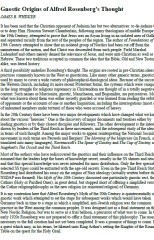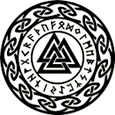
Author : Whisker James B.
Title : Gnostic Origins of Alfred Rosenberg's Thought
Year : 1982
Link download : Whisker_James_B_-_Gnostic_Origins_of_Alfred_Rosenberg_s_Thought.zip
It has been said that the Christian opponent of Judaism has but two alternatives: to de-judaize Christ or to deny Him. Houston Stewart Chamberlain, following many theologians of middle Europe in the 19th Century, attempted to prove that Jesus was an Aryan living in an isolated area of Gallilee, and separated racially from the rest of the peoples of the region. The author of Foundations of the 19th Century attempted to show that an isolated group of Nordics had been cut off from the mainstream of the nation, and that Christ was descended from such people. Field Marshal Ludendorf and others merely denied the relevance of Jesus, and were anti-Christian as well as anti- Hebrew. These two traditions accepted in common the idea that the Bible, Old and New Testaments alike, was literal history. A third possibility underlies Rosenberg's thought. The origins are rooted in pre-Christian ideas and practices commonly known in the West as gnosticism. Like many other generic terms, gnosticism is used by many to cover a wide variety of philosophical-theological ideas. Because of the success of the Western church, including its more recent Protestant forms, the systems which were vanquished in the long struggle for religious supremacy in Christendom are thought of in a totally negative context. Such names as Marcionite, gnostic, Manichaean, and Bogomilite, are perjoratives. Most of what was known about them was either secretly guarded or was learned from reading the refutations of opponents or the accounts of one or another Inquisition, including the interrogations (most often of unlearned members under torture) of those who were accused of heresy. In the 20th Century there have been two major developments which have changed what we know about the various "heresies." One is the discovery of major documents and treatises either by leading gnostics or by their closest disciples and followers. The other development is the interest shown by leaders of the Third Reich in these movements, and the subsequent study of the ideology in terms of such thought. Among the major works to appear reinterpreting the National Socialist movement in such terms are Pauwels and Bergiers' The Morning of the Magician (in French, and translated into many languages), Ravenscroft's The Spear of Destiny and The Cup of Destiny and Angebert's The Occult and the Third Reich. Most of the authors who have rediscovered the gnostics and their influence on the Third Reich have assumed that the leaders kept the bases of knowledge secret, usually in the SS shrines and rituals, and that this special knowledge was never intended for mass distribution. Only the few specially selected SS types could be entrusted with the age-old secrets. Even in the pre-Third Reich State, Rosenberg had distributed his essay on the origins of Nazi ideology (actually written before the NSDAP was formed). His Myth of the 20th Century discussed one particularly gnostic sect, the Cathars (Holy or Purified Ones), in great detail, but stopped short of offering a simplified version of the Cathar religionphilosophy as the new religion (or reinstated religion) of Germany. It is my contention here that Alfred Rosenberg's Myth of the 20th Century is quintessentially a gnostic work which attempted to set the stage for subsequent works which would have taken Germany back in time to a stage in which a simplified, anti-Jewish religion was the common practice in the West among the common peoples. It was designed not as a final statement on the New Nordic Religion, but was to serve as a trial balloon, a precursor of what was to come. In the early 1920s Rosenberg was not prepared to offer a final statement of this philosophy. The research necessary to the full creation had not yet been completed. It was a promise of things to come. It was a quest which may, in his terms, be likened unto King Arthur's setting the Knights of the Round Table on the quest for the Holy Grail. ...

Tourney Phillip - What I saw that day
Authors : Tourney Phillip F. - Glenn Mark Title : What I saw that day Year : 2011 Link download :...














